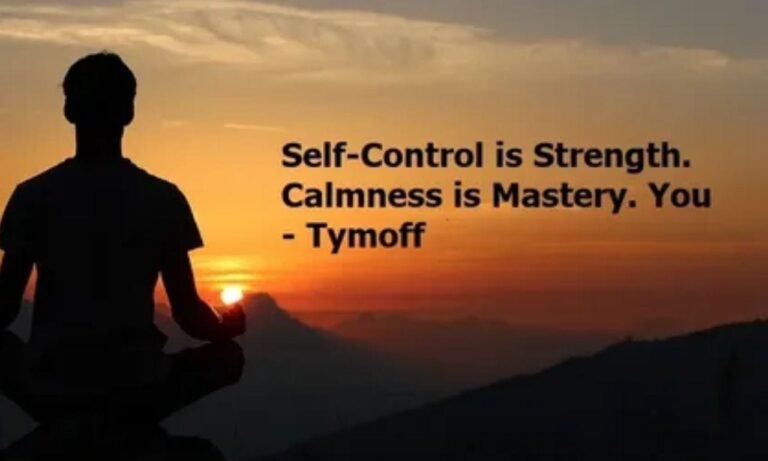Self-control and calmness are more than just virtues; they are fundamental skills that underpin our ability to navigate life’s challenges. Embracing the philosophy that “Self-Control is Strength. Calmness is Mastery. You – Tymoff” can profoundly influence your personal and professional growth. This approach is not just about restraining yourself but about understanding and managing your emotions and reactions in a healthy way.
Table of Contents
When we think of strength, often physical prowess comes to mind. However, true strength lies in the ability to maintain composure and control over one’s impulses and emotions. Calmness complements this by allowing us to approach situations with a clear, undisturbed mindset, enhancing decision-making and resilience. This introduction sets the stage to dive deeper into how these elements can be cultivated to foster an environment of personal mastery and success.
The Psychological Foundations of Self-Control
“Self-Control is Strength. Calmness is Mastery. You – Tymoff“: Self-control is deeply rooted in psychological science, where it’s seen as a cornerstone of emotional intelligence. This ability directly influences how we manage stress, make decisions, and navigate social interactions. Studies show that individuals with higher self-control can resist harmful impulses and are better at delaying gratification, which correlates with higher success rates in personal and professional domains.
Understanding self-control also involves recognizing its limits. Like a muscle, it can become fatigued from overuse during the day. Therefore, knowing how to manage and replenish your self-control reserves is crucial. This involves structured routines, adequate rest, and mindfulness practices, which can significantly boost your mental resilience and ability to focus.
Calmness as a Mastery of Self
“Self-Control is Strength. Calmness is Mastery. You – Tymoff”: Calmness is not merely about being quiet; it’s about achieving a state of mental stability that enables you to face challenges with clarity and purpose. Mastering calmness means learning how to quickly return to a state of equilibrium after emotional disturbances. This skill allows individuals to think clearly, maintain their focus during adversity, and reduce the impact of stress on their health.
Practicing calmness involves regular reflection, meditation, and the conscious decision to respond rather than react to situations. This mastery is beneficial not only for personal well-being but also enhances your interactions with others, promoting healthier relationships and a positive social environment. Learning to stay calm can transform potential conflicts into opportunities for growth and understanding.
Practical Tips to Enhance Self-Control
Enhancing self-control is a journey that requires consistent effort. Here are some practical tips:
- Set clear goals and break them down into manageable steps.
- Avoid situations where you might be tempted to break your self-control.
- Practice regular self-reflection to understand the triggers that challenge your self-control.
Adopting habits like regular exercise and sufficient sleep can also strengthen your self-control. These habits help maintain the brain’s health, particularly the prefrontal cortex, which governs our decision-making and impulse control. Consistently applying these strategies can lead to lasting improvements in your ability to maintain self-control.
Techniques for Cultivating Calmness in Everyday Life
Cultivating calmness on a daily basis is essential for maintaining mental balance and enhancing overall life quality. Here are a few techniques:
- Mindfulness and meditation: Start with just five minutes a day and gradually increase your practice.
- Deep breathing exercises: Use these techniques during stressful situations to maintain calm.
Another effective strategy is to create a calm environment at home and work. This might involve organizing your space, reducing noise, and surrounding yourself with calming colors and decor. Regular practice of these techniques can make calmness a more automatic response to stress.
The Interplay Between Self-Control, Calmness, and Personal Achievement
“Self-Control is Strength. Calmness is Mastery. You – Tymoff”: The synergy between self-control and calmness plays a pivotal role in achieving personal and professional goals. Self-control provides the foundation for consistent work toward long-term goals, while calmness ensures that challenges are handled with clarity and precision. Together, these traits create a powerful framework for success.
For instance, consider a professional who uses self-control to manage time effectively and calmness to handle work pressure without stress. Such a person is likely to achieve higher productivity and better outcomes. This synergy not only contributes to individual success but also fosters a healthier, more balanced life.
Conclusion
As we conclude, remember that integrating self-control and calmness into your daily life is a transformative journey that requires patience, practice, and persistence. Start small, perhaps with one or two techniques discussed, and gradually build your capacity for self-control and calmness.
Encouraging personal anecdotes or reflecting on your progress can be motivating. Consider keeping a journal or sharing your experiences with friends or mentors who can provide support and insight. As you grow in these areas, you’ll find that not only do your personal achievements increase, but your overall quality of life improves as well.
Read More : it is not wisdom but authority that makes a law. t – tymoff

